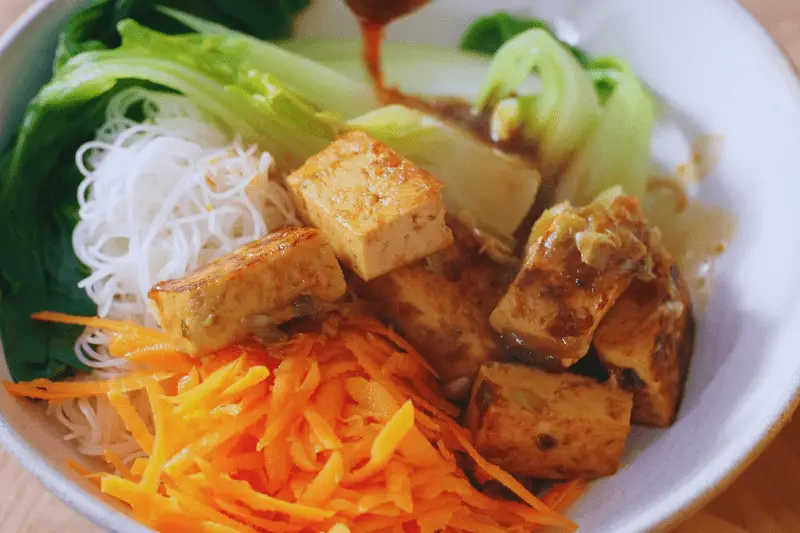Are you tired of the same old ramen? Want to add some extra crunch and tanginess to your noodle bowl?
Look no further than pickled carrots! Not only do they add a burst of flavor to your meal, but they also provide a range of health benefits.
In this article, we’ll explore the ins and outs of pickled carrots for ramen, from their nutritional value to the steps for making them at home.

Why Pickled Carrots are a Great Addition to Ramen
Nutritional Benefits of Carrots
Carrots are root vegetables that are packed with nutrients.
They are a good source of fiber, vitamins A and K, and potassium. In addition, they are low in calories and have a low glycemic index, making them a great choice for those looking to maintain healthy blood sugar levels.
Health Benefits of Pickled Foods
Pickled foods are a great way to add probiotics to your diet, which can improve gut health and boost the immune system.
In addition, they can help to preserve the nutrients in vegetables and fruits, making them a great option for those looking to reduce food waste.
Flavor Combinations with Ramen
Ramen is a dish that is known for its complex flavors.
From the umami-rich broth to the chewy noodles, there are many components that make up a delicious bowl of ramen.
Adding pickled carrots to your bowl can add a new layer of flavor, providing a balance of sweetness, acidity, and crunch. They pair well with a range of broth flavors, from spicy miso to creamy tonkotsu.
How to Pickle Carrots for Ramen
Ingredients
To make pickled carrots, you’ll need:
- 1 pound of carrots, peeled and sliced into thin rounds
- 1 cup of rice vinegar
- 1 cup of water
- 1/2 cup of sugar
- 1 tablespoon of salt
- 1 tablespoon of pickling spice (optional)
Steps for Pickling
- Combine the rice vinegar, water, sugar, salt, and pickling spice (if using) in a saucepan. Heat over medium heat until the sugar and salt have dissolved.
- Add the sliced carrots to a clean jar or container. Pour the pickling liquid over the carrots, making sure they are fully submerged.
- Let the carrots sit at room temperature for at least 1 hour, or refrigerate for up to 24 hours. The longer they sit, the more tangy and flavorful they will become.
Tips for Adding Pickled Carrots to Ramen
Pairing with Broth and Noodles
When it comes to pairing pickled carrots with ramen, there are a few things to keep in mind. First, consider the flavor profile of the broth.
If you have a spicy or bold broth, the acidity of the pickled carrots can help balance out the heat. If you have a milder broth, the sweetness of the carrots can complement it well.
Next, consider the type of noodle you are using.
Thinner noodles like ramen or soba can be paired with a larger amount of pickled carrots, as they will not overpower the dish.
Thicker noodles like udon can handle a larger amount of toppings, so feel free to pile on the pickled carrots.
Topping Options
Pickled carrots can be used as a standalone topping or combined with other ingredients. Some popular toppings for ramen include soft-boiled eggs, green onions, nori, and sliced pork.
Try combining these toppings with pickled carrots for a bowl that is packed with flavor and texture.
Frequently Asked Questions
Can I use other vegetables for pickling?
Yes, you can use a variety of vegetables for pickling, including cucumbers, radishes, and onions. Experiment with different combinations to find the flavors that work best for you.
How long do pickled carrots last?
Pickled carrots can last up to several weeks in the refrigerator. However, their flavor and texture may change over time, so it’s best to consume them within a week or two.
Can I use store-bought pickled carrots?
Yes, you can use store-bought pickled carrots if you’re short on time. Look for pickled carrots that are made without any added preservatives or artificial flavors.
How can I adjust the level of tanginess in the pickling liquid?
If you prefer a more or less tangy pickling liquid, you can adjust the amount of vinegar and sugar in the recipe. More vinegar will make the pickling liquid more tangy, while more sugar will make it sweeter.
Are there any risks with pickling at home?
When pickling at home, it’s important to follow proper safety precautions to avoid the risk of botulism. Use clean, sterilized jars and utensils, and make sure the vegetables are fully submerged in the pickling liquid.
If you notice any signs of spoilage, such as mold or off-putting smells, discard the pickled vegetables immediately.
Conclusion
Pickled carrots are a delicious and healthy addition to your ramen bowl. Not only do they provide a burst of flavor and crunch, but they also offer a range of nutritional and health benefits.
Try making your own pickled carrots at home, and experiment with different flavor combinations to find your favorite. Your taste buds (and gut) will thank you!
FAQ
- Can I use other vegetables for pickling?
Yes, you can use a variety of vegetables for pickling, including cucumbers, radishes, and onions. Experiment with different combinations to find the flavors that work best for you.
- How long do pickled carrots last?
Pickled carrots can last up to several weeks in the refrigerator. However, their flavor and texture may change over time, so it’s best to consume them within a week or two.
- Can I use store-bought pickled carrots?
Yes, you can use store-bought pickled carrots if you’re short on time. Look for pickled carrots that are made without any added preservatives or artificial flavors.
- How can I adjust the level of tanginess in the pickling liquid?
If you prefer a more or less tangy pickling liquid, you can adjust the amount of vinegar and sugar in the recipe. More vinegar will make the pickling liquid more tangy, while more sugar will make it sweeter.
- Are there any risks with pickling at home?
When pickling at home, it’s important to follow proper safety precautions to avoid the risk of botulism. Use clean, sterilized jars and utensils, and make sure the vegetables are fully submerged in the pickling liquid. If you notice any signs of spoilage, such as mold or off-putting smells, discard the pickled vegetables immediately.
